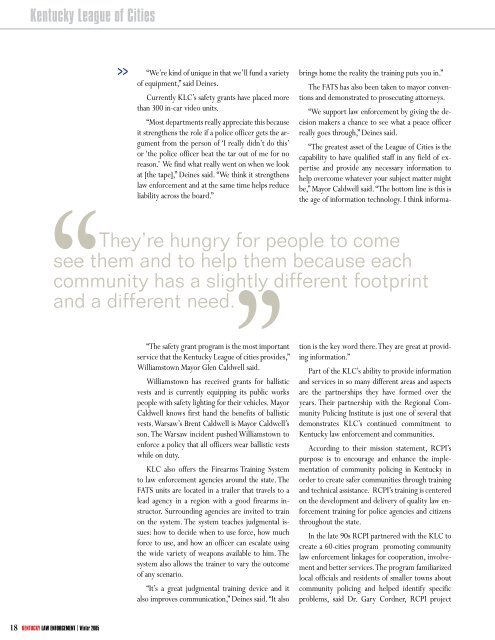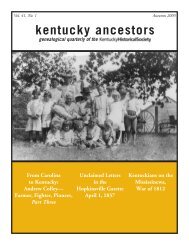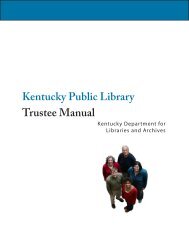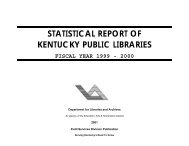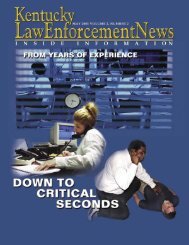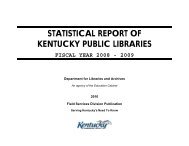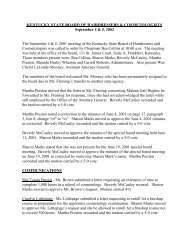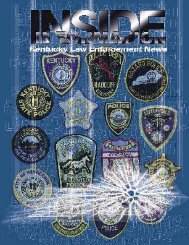4 - e-archives Home
4 - e-archives Home
4 - e-archives Home
Create successful ePaper yourself
Turn your PDF publications into a flip-book with our unique Google optimized e-Paper software.
Kentucky League of Cities<br />
>> “We’re kind of unique in that we’ll fund a variety<br />
of equipment,” said Deines.<br />
Currently KLC’s safety grants have placed more<br />
than 300 in-car video units.<br />
“Most departments really appreciate this because<br />
it strengthens the role if a police officer gets the argument<br />
from the person of ‘I really didn’t do this’<br />
or ‘the police officer beat the tar out of me for no<br />
reason.’ We find what really went on when we look<br />
at [the tape],” Deines said. “We think it strengthens<br />
law enforcement and at the same time helps reduce<br />
liability across the board.”<br />
“They’re hungry for people to come<br />
see them and to help them because each<br />
community has a slightly<br />
”<br />
different footprint<br />
and a different need.<br />
“the safety grant program is the most important tion is the key word there. they are great at provid-<br />
service that the Kentucky League of cities provides,” ing information.”<br />
Williamstown Mayor Glen Caldwell said.<br />
1 KENTUCKY LAW ENFORCEMENT| Winter 2005<br />
Williamstown has received grants for ballistic<br />
vests and is currently equipping its public works<br />
people with safety lighting for their vehicles. Mayor<br />
Caldwell knows first hand the benefits of ballistic<br />
vests. Warsaw’s Brent Caldwell is Mayor Caldwell’s<br />
son. the Warsaw incident pushed Williamstown to<br />
enforce a policy that all officers wear ballistic vests<br />
while on duty.<br />
KLC also offers the Firearms training system<br />
to law enforcement agencies around the state. the<br />
Fats units are located in a trailer that travels to a<br />
lead agency in a region with a good firearms instructor.<br />
surrounding agencies are invited to train<br />
on the system. the system teaches judgmental issues:<br />
how to decide when to use force, how much<br />
force to use, and how an officer can escalate using<br />
the wide variety of weapons available to him. the<br />
system also allows the trainer to vary the outcome<br />
of any scenario.<br />
“It’s a great judgmental training device and it<br />
also improves communication,” Deines said. “It also<br />
brings home the reality the training puts you in.”<br />
the Fats has also been taken to mayor conventions<br />
and demonstrated to prosecuting attorneys.<br />
“We support law enforcement by giving the decision<br />
makers a chance to see what a peace officer<br />
really goes through,” Deines said.<br />
“the greatest asset of the League of Cities is the<br />
capability to have qualified staff in any field of expertise<br />
and provide any necessary information to<br />
help overcome whatever your subject matter might<br />
be,” Mayor Caldwell said. “the bottom line is this is<br />
the age of information technology. I think informa-<br />
Part of the KLC’s ability to provide information<br />
and services in so many different areas and aspects<br />
are the partnerships they have formed over the<br />
years. their partnership with the regional Community<br />
Policing Institute is just one of several that<br />
demonstrates KLC’s continued commitment to<br />
Kentucky law enforcement and communities.<br />
according to their mission statement, rCPI’s<br />
purpose is to encourage and enhance the implementation<br />
of community policing in Kentucky in<br />
order to create safer communities through training<br />
and technical assistance. rCPI’s training is centered<br />
on the development and delivery of quality law enforcement<br />
training for police agencies and citizens<br />
throughout the state.<br />
In the late 90s rCPI partnered with the KLC to<br />
create a 60-cities program promoting community<br />
law enforcement linkages for cooperation, involvement<br />
and better services. the program familiarized<br />
local officials and residents of smaller towns about<br />
community policing and helped identify specific<br />
problems, said Dr. Gary Cordner, rCPI project


